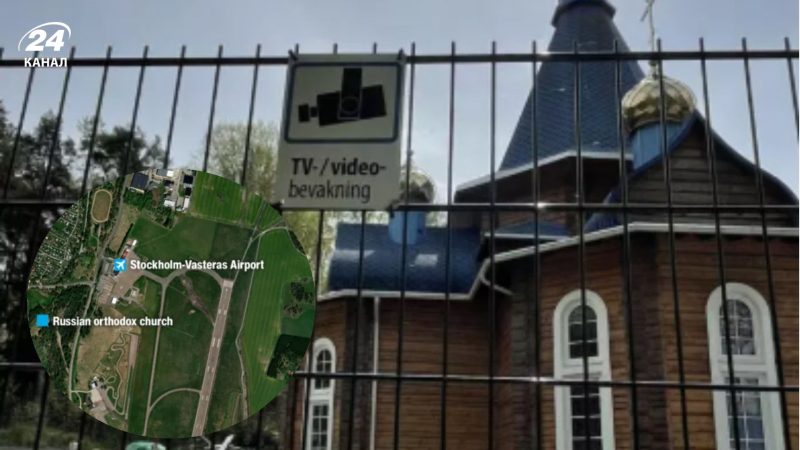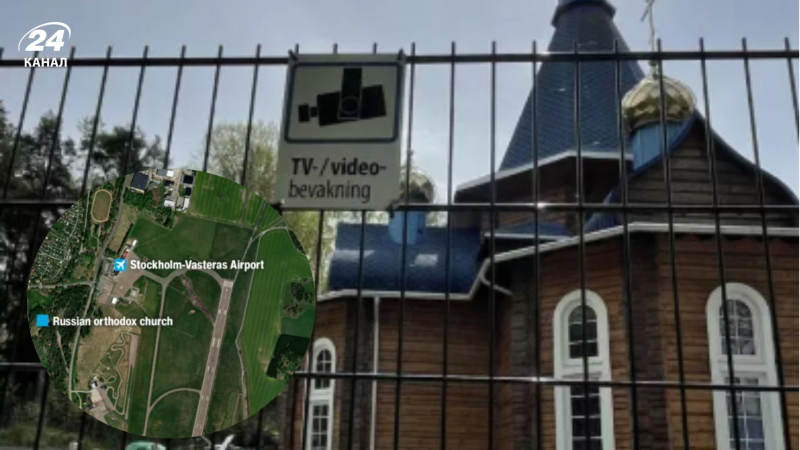Key points
- A Russian Orthodox church in Sweden is suspected of being a spy because of its location near an airport and its strange behavior, including limited access for visitors and the presence of surveillance cameras.
- The church's rector, Pavel Makarenko, has ties to Russian intelligence, was convicted of financial fraud, and received a medal for his service to intelligence.

Russian Orthodox Church Temple in Sweden Suspected of Spying / Collage by Channel 24, photo by France 24
In Sweden, a Russian Orthodox church is suspected of spying for Russia. It is located near the Swedish city of Vasteras and only 300 meters from an important airport.
Everything about this Russian church of Our Lady of Kazan is strange, and it's not just its proximity to the airport, Channel 24 reports, citing France 24.
The church is rarely visited, and there is a “No Entry” sign at the entrance.
Swedish intelligence suggests that Russia is using the church in Västerås for espionage or other harmful activities for Sweden's national security.
It is noted that the territory is fenced with a high steel fence. The church has surveillance cameras. In addition, a spire more than twice as high as planned was placed on it.
Its height is 22 meters, although it could not exceed 10 meters due to its proximity to the airport.
It seems that parishioners are not welcome there either, because there is a “No Entry” sign at the entrance. There is no bell on the gate, and no one answers the phone number listed there.
A local resident said that it is quite rare for anyone to be on the church grounds, although she once saw a man with a guard dog.
The woman noted that this church only holds two services weekly.
The church's rector has a medal for intelligence service.
The priest of this church is elusive, and he could have been approved for the position by the Russian Foreign Intelligence Service.
This is Pavel Makarenko. He moved to Sweden in 1990 and lived a modest life with his wife and daughter.
When the church was being built, he actively communicated with the media. But after they began to inquire about the financing of the church and contacts with Russian intelligence services, he was only filmed a few times.
Interestingly, for several years, Makarenko, in addition to his religious duties, was also the general director of the Russian import-export company NC Nordic Control AB.
But in 2021, he was found guilty of aggravated accounting fraud and resigned while maintaining his innocence.
After losing the appeal, he received a suspended sentence of 6 months, 160 hours of community service and a ban on business activities for 3 years.
By the way, Makarenko was awarded a medal for “good service” to the Russian Foreign Intelligence Service.
France 24 journalists once attended a Sunday service at his church, but were thrown out because they saw a hidden camera.
There were “red flags” back in 2012
The publication notes that in 2012, the Swedish parish of the Russian church was actively interested in the territory of the sparsely populated area of Hasslo, where the main highway of Västerås runs. After that, the Russian Orthodox Church, for the first time since the creation of its church organization in Sweden in 1992, announced the construction of its own church in the Scandinavian country.
It was given specifically to the Westerosi community.
Journalist Mikaela Lundblad noted the “red flags” of these actions. After 2012, the world changed its attitude towards Russia.
There were warning signs… Crimea was annexed and the Swedish domestic intelligence service publicly stated that Russia was now one of the biggest potential threats to the country's security, she said.
Intelligence tried to stop the construction of the church from the very beginning, but due to the mistakes of one person at the municipal level and “bad communication” at the local level, calls and warnings about the danger were not heeded.
But now Westeros is already trying to escape Russian spies. The city authorities have approved a proposal to investigate the possible expropriation of the church.
NATO exercises held at airfield near Westeros
Just 300 metres from Makarenko Church is the Stockholm-Vasteras civil airport (VST). It has the third largest runway in the country.
The Swedish Air Force was once based there, but the airfield was closed in 1983.
After Sweden joined NATO in 2024, the airfield again acquired strategic military significance. The Alliance now regularly holds exercises there.
“There is nothing normal about a church so close to the airport,” said control tower manager Andreas Nyqvist.
By the way, it is also not far from Västerås to the capital of Sweden, Stockholm – only 1.5 hours’ drive.
In addition, the city is located on the shores of Lake Mälaren, which is a strategically important corridor with access to the Baltic Sea. In addition, several key bridges run through it.
Västerås also connects east and west, Stockholm and Norway. It also passes through a number of important sites, including the Swedish Army Command and Control Regiment in Enköping.
How the MP is taking over churches in Sweden
The Moscow Patriarchate in Sweden has 5 communities with 2,000 members. Intelligence, shortly after the church's official opening in late 2023, claimed that Swedish supporters of the Russian Orthodox Church had been in contact with Russian intelligence services, supported Russia's invasion of Ukraine, and even allegedly received significant funding from Moscow.
After this, the Swedish authorities stopped financial support for all ROC communities.
By the way, the Moscow Patriarchate tried to “occupy” not only Västerås. The head of the oldest church of the Russian Orthodox Church in Sweden, Father Angel, complained that his church had become a “target for seizure.”
Thus, in 2019, MP representatives occupied the central church in Stockholm. The priest claims that at that time he “fought tooth and nail” to “protect” his multinational parish from “pro-Moscow nationalism and politicization organized by Patriarch Kirill.”
“There were Russian agents. Of course, not all of them were agents, but there were agents who led these efforts to take over our parish and subordinate it to Moscow… They were trying to stage a coup d'etat, but I realized in time what they were doing,” Father Angel said.
Now his parish is connected with the Bulgarian Patriarchate, which allows him to be kept as far away as possible from Putin and Patriarch Kirill.
But not everyone was so lucky. For example, the parishioners of St. Siegfried's Chapel in Stockholm's Aspuden district noticed their fascination with the Moscow Patriarchate too late.
The church, which was built back in 1900, fell victim to the MP in 2020. The same group of agents who encroached on Father Angel's church temporarily rented the premises of this chapel and then refused to leave, having carried out a series of first unsuccessful and then successful machinations.
They stole this church. They stole it with their eyes open. They forgot the seventh commandment, “Thou shalt not steal.” I couldn't even get into my church. I couldn't get to my priest's vestments that were hanging here because they had changed the locks, the pastor of the church said.
He said that his son once saw a surveillance camera in a church. As soon as he took it apart, a Russian-speaking man in a military uniform immediately approached him.
Only after 4 years of struggle was the church saved from the clutches of the Russian Orthodox Church.
Its pastor noted that the chapel also had a strategic location, with its spire offering a full view of Stockholm.
It is also located just a step away from the bridge that connects Stockholm's main transport artery, Essingeleden, and one of the country's most important transport corridors.



